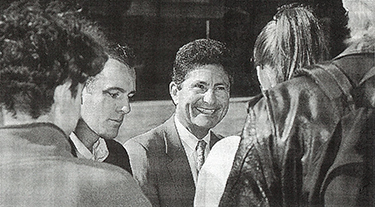New president’s first weeks cover UW and the state

President Richard L. McCormick (center) meets with students on the HUB lawn. To his left is ASUW President Garrick Hileman. Photo by David M. Opincarne.
President Richard L. McCormick’s first weeks in office have included a whirlwind tour of eastern Washington, speaking engagements to hundreds of groups and consultations about the big strategic choices facing the UW.
McCormick is displaying a “maniacal work ethic that rivals Microsoft,” says Board of Regents President Scott Oki. At his first official regents meeting Sept. 20, McCormick and Oki signed a list of 20 expectations that the regents will use to assess McCormick’s performance.
Since the President arrived Sept. 1 from the University of North Carolina at Chapel Hill, he has spoken to thousands of people. At the beginning of the academic year, he set aside approximately two hours every day to make an on-site visit to each of the UW’s 16 schools and colleges. He also made trips to the branch campuses at Bothell and Tacoma. Off campus, McCormick has met with editorial boards, business groups, government leaders, alumni, educators and even the president of WSU.
McCormick says that the UW is more than living up to its reputation. “I expected it to have world class programs in dozens of places, and it does. I expected the faculty, students, staff, alumni and greater Seattle community to be warm and supportive of their University, and they are. I expected to find some challenges, and there are some,” he says.
Among those challenges are the limits on UW resources, such as state funding, federal research dollars and student tuition. Another challenge is the strategic direction of the UW. “There are some important questions surrounding the UW—what this University is and what it will do in the future,” McCormick says.
To help answer those questions, the regents have established a new strategic planning committee, chaired by Regent Jon Runstad. McCormick has appointed task forces on environmental studies and public service, and is also waiting for the report from an international studies task force appointed by former President Gerberding. On Nov. 14 McCormick made a major address to the UW community presenting his vision for the future. Excerpts from that address will appear in the March Columns.
One of the highlights of his first weeks in office was meeting UW alumni, says McCormick. The President addressed the September meeting of the UWAA Board of Trustees and visited alumni groups in Wenatchee, Yakima and Spokane during a trip to eastern Washington Sept. 12-14. He also stopped in the Tri-Cities and Pullman.
“It was extremely exciting for me. I saw what a beautiful, richly diverse part of the state it is, and that it includes people who are very proud of the UW,” he says.
During his stop in Pullman, McCormick met with WSU President Sam Smith. Though there will always be rivalry on the playing field, McCormick says the UW and WSU have much in common, sharing the challenge to educate and serve the people of the state.
After his first month in office, McCormick says he is still thrilled to have his new job. “I’m working hard to learn more about the University, looking for places where I can enhance the University’s resources and its strengths,” he says. “I’m proud to be the president of the University of Washington.”
Great expectations: 20 goals for new UW President Richard McCormick
The following is a list of “expectations” the UW regents set for President McCormick at its Sept. 20 meeting.
- Promote excellence throughout the University’s academic programs and other activities.
- Encourage access to higher education through every appropriate means, including the development of the branch campuses at Bothell and Tacoma.
- Provide leadership for University-wide strategic thinking and farsighted planning.
- Cooperate actively in pursuit of common goals with all the other institutions of higher education in the state of Washington.
- Promote and explain the University’s public service to the people of Washington.
- Strengthen the University’s partnership with K-12 education.
- Build a first-rate management team.
- Establish strong and trusting relationships with all the key elements of the University community, including faculty, students, staff, alumni and parents.
- Work with public officials, corporate and labor leaders, and community leaders.
- Develop cooperative working relationships with the Legislature, the Executive Branch and the Higher Education Coordinating Board.
- Establish means of accountability and consistent institutional improvement in the University’s core missions of teaching, research and service.
- Take special steps to strengthen the University’s programs of undergraduate education.
- Foster excellent graduate education and research as distinguishing characteristics of the UW.
- Maintain and enhance the quality of the University’s faculty.
- Manage the challenges facing the University’s academic health center and hospitals.
- Ensure that the intercollegiate athletic program is characterized by integrity, academic focus and financial stability.
- Encourage diversity within the University’s student body, faculty and staff.
- Take every appropriate step to increase the resources available to the University of Washington from governmental bodies, private donors and other sources.
- Create and seize new opportunities to enhance the distinction of the University.
- Communicate effectively important information about the University to diverse constituencies within and beyond the University community.